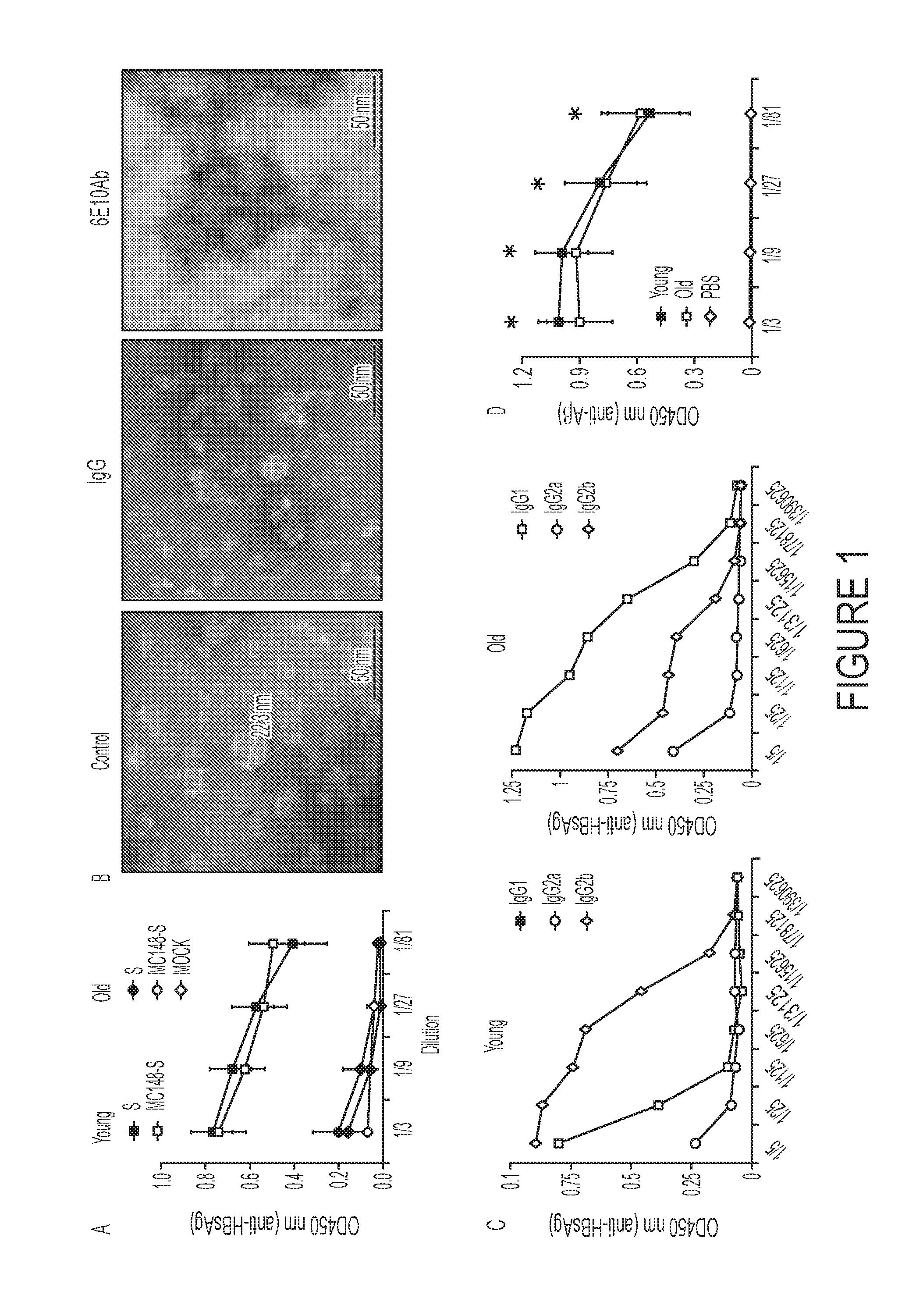Vaccines for protection from and treatment of alzheimer's disease
a technology for alzheimer's disease and alzheimer's disease, applied in the field of alzheimer's disease vaccines, can solve the problems of pathoneurophysiological impairment and death, about 70% of test subjects, and the rationale for their use at the onset of the disease remains debatable, so as to reduce the severity of alzheimer's disease, increase survival, and reduce the effect of a plaques
- Summary
- Abstract
- Description
- Claims
- Application Information
AI Technical Summary
Benefits of technology
Problems solved by technology
Method used
Image
Examples
example 1
Aβ-CoreS is a Potent Immunogen in Young and Old Mice
[0086]This Example was performed to test whether vaccination at onset of AD can be effective. As background, prior to the present disclosure it remained poorly understood whether AD could be combated by vaccine administration at the onset of the disease, as vaccines can lose their efficacy due to tolerance to Aβ and old age-associated immunological impairments.
[0087]In Vivo Manipulations.
[0088]Three different groups of mice were immunized three or four times (as indicated for specific experiments) every two weeks starting when mice were 4 months old (young mice), 1 year old, or 1.5 years old. To do this, mice were electroporated with 25 μg DNA in 50 μl endotoxin-free water intradermally in the base of the tail using a parallel row needle array (with two rows of four needles / row, a 1 mm gap between needles within a row, a 4 mm gap between rows and a needle length of 3 mm) connected to a PA-4000 electroporation system (Cyto Pulse Sci...
example 2
T Cell Activation Assay
[0094]To assess T cell proliferation, splenocytes from immunized and mock-treated mice were first labeled with carboxyfluorescein succinimidyl ester (CFSE, Invitrogen, Carlsbad, Calif.). The cells then were stimulated with either 1 μg / ml of Aβ(1-42) or 10 μg / ml of HBsAg (#R86870, Biodesign, Saco, Me.) in RPMI1640 medium containing 10% fetal bovine serum and antibiotics and 50 U / ml of IL-2. Control CFSE-labeled cells (1×105) were stimulated with anti-CD3 / CD28-coupled beads or mouse-gp10025-33 (EGSRNQDWL; SEQ ID NO:5).
[0095]After 7 days incubation, the cells were stained with anti-CD4 and anti-CD8 antibodies (BD Biosciences Pharmingen, San Jose, Calif.) to quantify the proportion (%) of proliferated (CFSE-diluted) cells which was calculated as: (Experimental−target spontaneous) / (target maximum after anti-CD3 / CD28 Aβ treatment−target spontaneous)×100.
[0096]For 3xTgAD splenocytes, the cells were also re-stimulated for another 7 days with irradiated autologous bone...
PUM
| Property | Measurement | Unit |
|---|---|---|
| pulsed voltage | aaaaa | aaaaa |
| length | aaaaa | aaaaa |
| length | aaaaa | aaaaa |
Abstract
Description
Claims
Application Information
 Login to View More
Login to View More - R&D
- Intellectual Property
- Life Sciences
- Materials
- Tech Scout
- Unparalleled Data Quality
- Higher Quality Content
- 60% Fewer Hallucinations
Browse by: Latest US Patents, China's latest patents, Technical Efficacy Thesaurus, Application Domain, Technology Topic, Popular Technical Reports.
© 2025 PatSnap. All rights reserved.Legal|Privacy policy|Modern Slavery Act Transparency Statement|Sitemap|About US| Contact US: help@patsnap.com



